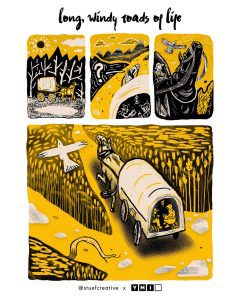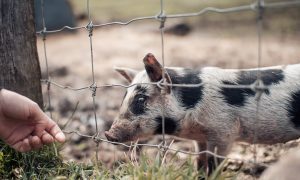Should I Stay or Should I Go?
Written by Abel Cheah
Abel Cheah is the Associate Vicar at Holy Trinity Bukit Bintang (HTBB), and he heads leadership development at the Asia Pacific Hub. His previous roles include being the Chief Operating Officer of Alpha Asia Pacific, National Coordinator of Alpha Malaysia, and Head of Regions for Teach for Malaysia. Abel is married to Jacintha, who also pastors at HTBB.
When you were younger, this question might have come in the form of deciding whether to stay in your friendship circle or to leave it. Then when you began dating as you got older, maybe you wondered, should I stay in this relationship, or step away from it? When you started working, this question came with that difficult boss, an unhealthy working culture, or terrible working hours.
When you’re experiencing some kind of resistance or setback in your life, this question takes on that tension—to quit or to endure. But you may also be in a place of relative comfort, and still, you could be asking, should I stay, or should I move on to something different?
In a situation of challenge or change, we can often feel like there are too many possible options, too much complexity. So I want to share this framework for how we can think and pray through what to do when we feel stuck.
The different journeys that God took His people through in the Bible presents us with three options, or lenses through which we can look at our situation:
1. The Exodus: a change in location
The first major journey that the Hebrew people took in the Bible is the Exodus—a journey from slavery into freedom.
In Exodus 3, we read:
The Lord said, “I have indeed seen the misery of my people in Egypt. I have heard them crying out because of their slave drivers, and I am concerned about their suffering. So I have come down to rescue them from the hand of the Egyptians and to bring them up out of that land into a good and spacious land…” (Exodus 3:7-8)
I wonder if you resonate with the plight of these people. You may not be experiencing physical slavery now, but you may be emotionally stuck and mentally bound.
The pattern of Exodus is this: in our lives we will encounter difficulties and dead-ends. Call them the shackles of bondage that hold us back from our God-given purpose.
In the story of the Exodus, God leads his people to change location. But freedom doesn’t come freely—it is bought at a price, met often with resistance. And it’s often our fear that holds us back. But God calls us to face our fears before we can find true freedom.
It must be said that this option to change location comes with three warnings:
- Bad decisions are often good, viable options applied at the wrong moments
- In a world of limitless options, quitting can be more emotionally appealing than remaining
- In many fields of life, the good stuff often happens after the hard stuff
Wisdom is to determine if taking the option to change location is a step of courage borne from conviction or a step of escape borne from fear.
How do we make sure taking the step to change location isn’t a step of premature quitting?
Paul wrote this to the Corinthian church: “My dear friends, stand firm and don’t be shaken. Always keep busy working for the Lord. You know that everything you do for him is worthwhile.” (1 Corinthians 15:58, CEV)
So, inspect what is worthwhile—its long-term worth. I find this simple way of decision-making quite helpful: Ask yourself:
A: Is it hard and worthwhile? Lean into enduring.
B: Is it hard and worthless? Lean into re-evaluating.
2. The Wilderness: a change in character
The second major journey that God takes His people through is not a physical journey, moving from place A to place B, but a shift of postures in the same place—from a posture of blame to a posture of responsibility.
After the miraculous escape from Egypt, the people of God reached a place called Kadesh Barnea, which bordered the Promised Land of Canaan. 12 spies were sent to spy the land: two came back with hopeful news, the rest came back with a bad report. Unfortunately, the people believed the report of the 10 doubters, and they lost heart and began to blame their leaders. In Numbers 14:1-2, we read:
“That night all the members of the community raised their voices and wept aloud. All the Israelites grumbled against Moses and Aaron, and the whole assembly said to them, “If only we had died in Egypt! Or in this wilderness!”
And for their complaining and posture of blame, God extended their journey that could have taken 11 days to 40 years.
The wilderness is a frustrating place, but also a deeply forming one. Some of the most significant moments of our character development can take place when we are stuck in the same location, for it is exactly in the place of frustration that we experience a movement or growth in our character.
In Acts 13:18, we read, “for about forty years [God] endured their conduct in the wilderness…” In some manuscripts, it says, “God cared for them” in the wilderness.
If you are in the Wilderness right now and you feel like you’re being punished, consider that God is taking you through it not with a heart of spite but a heart of care.
As Rick Warren said, “What happens to you is far less important than what happens in you.” Because everything that happens to you is temporary, in light of our eternal destiny in God. What happens in you, on the other hand, is eternally significant.
If Option 1 is about the courage to cross over from bondage to freedom, Option 2 is the courage to stay and surrender.
To be a student of how God is refining and reforging our character in the place of struggle.
To not quit prematurely, because what comes after something hard is often something good.
The path of the Wilderness is about overcoming an old pattern in the very place of our struggle, which then makes us new.
I wonder if, like me, you often gravitate towards Option 1 (change location) because Option 2 (change myself) is much harder, more frustrating to bear. It’s easier to walk away from the heat than to stay growing in the fire, which is why Option 2 can feel like the process of dying and surrender.
In Galatians 2:20 (ESV), Paul writes, “I have been crucified with Christ. It is no longer I who live, but Christ who lives in me. And the life I now live in the flesh I live by faith in the Son of God, who loved me and gave himself for me.”
At this option of changing myself, the decision is to decide to die to self.
You can know today that following Jesus doesn’t necessarily mean uprooting yourself and changing your jobs, friends, countries and lifestyle. More often than not, God saves us and calls us in the very place where He meets us.
3. The Exile: to bring change to a place or situation
The third major journey that the Hebrew people took in the Bible is a journey from self-preservation to love and service.
In Jeremiah 29:5-7, the people of God had been exiled into Babylon, a foreign land—a place of subjugation—and God told the Hebrew exiles:
“Build houses and settle down; plant gardens and eat what they produce. . . seek the peace and prosperity of the city to which I have carried you into exile. Pray to the Lord for it, because if it prospers, you too will prosper.”
In the Exile, we don’t exactly change jobs, our partners, or countries or circumstances. What we do change is what we bring to those places—to bless and bring value.
You and I are commissioned by God to bring something of God’s kingdom to the places of our lives. We are to be part of His mission to change the world with an expanding grace and goodness to a world desperate for peace and love.
This might look different for each of us. It might look like choosing to stay in your country to invest in her people. It might look like investing intentionally into your marriage, so that it’s not just a pragmatic arrangement but a loving union that blesses others. It might be to be a good model of faithfulness to your family.
When my mother was a university student, she decided to follow Jesus. She had come from a staunch Taoist family. When she told her parents that she had become a Christian, she was immediately exiled from her home for betraying her Chinese roots and accepting a “Western religion”.
The next few years of being a stranger to her family were painful but formative years for her. My mum had not turned away from her culture, she had only turned away from her sins. But she still had to make a decision about keeping her faith. And it was during the funeral of her father that my mum was tempted to walk away from her exile, to give up and return to the ways of her past.
Struck with grief, my mother was asked to hold the joss-stick and say a prayer for her deceased father. She took it and said, “I will do this out of my love for my father.” But as she raised it, something unusual happened. The embers from the joss-stick leapt unto the cloth of the altar, and it caught fire very quickly. Her family quickly put it out and then said, with a new realisation, “Don’t pray to our gods—your God is very powerful.”
From that day, my mum’s faith grew with a new strength, but so did her love for her family. Today, she’s not the only Christian in her family—others too have come to faith through her testimony.
I wonder if you are in exile, facing difficulty, but put there because you are sent on a peace-keeping mission. Perhaps the people you are with are the very people God loves and wants to reach—and He is using you.
Jesus said, in Matthew 5:9, “Blessed are the peacemakers, for they will be called children of God” (Matthew 5:9). Being a Christian makes you a change agent, a carrier of hope and peace to a world that needs God’s love.
As you reflect on your situation and consider whether it is a decision to change location, change yourself, or change a situation, know this:
The Father loves you and He’s with you in your wilderness.
The Son died for you, to bring you freedom in your exodus.
The Spirit is in you, to strengthen you in your exile.
God enables us in whatever season we’re in.
This article was first presented as a Sunday message at HTBB. This version has been edited by YMI.















Vicar Abel, this is such a powerful message! So clear and full of wisdom. Thank you for generously sharing your sermon!
I praise God for being able to read this. I got terminated from work without a warning last Tuesday. I’m grateful to the Lord that He contained my heart with His grace & mercy. I’m entrusting everything to Him. Thank you for the truth of God in this article. God bless.